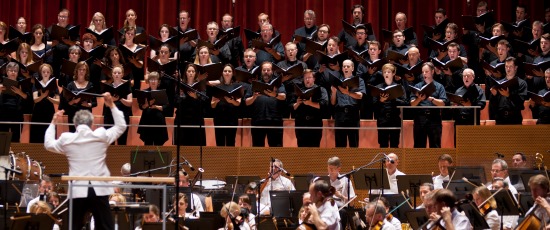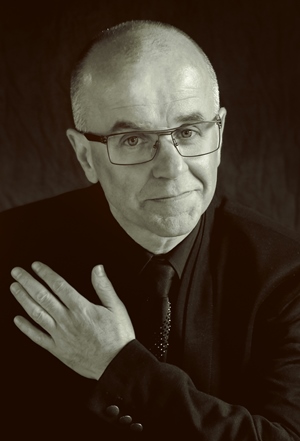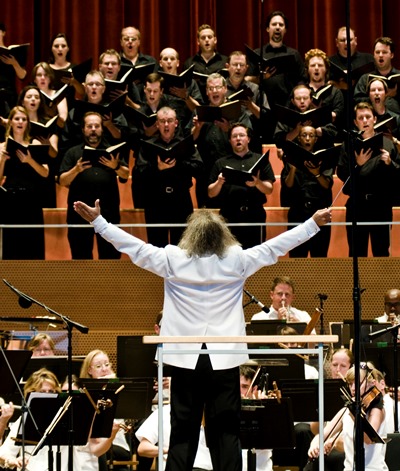Grant Park Chorus director Christopher Bell, newly lauded, cues troops for ‘War Requiem’
 Preview: Having just received a lifetime achievement award from Chorus America, Bell focuses on his choir’s performances of Benjamin Britten’s anti-war masterpiece June 28-29 at Millennium Park.
Preview: Having just received a lifetime achievement award from Chorus America, Bell focuses on his choir’s performances of Benjamin Britten’s anti-war masterpiece June 28-29 at Millennium Park.
By Lawrence B. Johnson
On a vigorous summer schedule for the Grant Park Chorus and its lately honored director, performances of Benjamin Britten’s monumental “War Requiem” June 28-29 pose the kind of challenges that choristers live for.

“A piece of music has to weather the storms of time, and the ‘War Requiem’ has shown its staying power,” says Grant Park Chorus director Christopher Bell, who earlier this month received a lifetime achievement award at Chorus America’s annual convention in Seattle. “What Britten created has proved to be one of the most compelling and engaging works in the choral repertoire. He knew how to write for voices.”
Bell, who has served as director of the Grant Park Chorus since 2001, was presented with the 2013 Michael Korn Founders Award at the Seattle gathering in recognition of his lifetime service to the choral profession.
In addition to working with the Grant Park Music Festival, Bell, a native of Belfast, is chorus master of the Edinburgh Festival Chorus, the Royal Scottish National Orchestra Junior Chorus, and the Belfast Philharmonic Choir.
He also helped to form the National Youth Choir of Scotland in 1996, which he has served as its only artistic director. In 2012, Bell was awarded an honorary doctor of music degree by the Royal Conservatoire of Scotland in Glasgow for his contributions to music in Scotland.
With Prokofiev’s cantata “Alexander Nevsky” already under its belt this summer and the “War Requiem” at hand, Bell’s choir also will sing an evening of Rodgers and Hammerstein July 17, Schubert’s Mass in E-Flat Aug. 9-10 and John Adams’ “Harmonium” on a program with Stravinsky’s “The Rite of Spring” Aug. 16-17 to cap the 2013 series at Pritzker Pavilion in Millennium Park.
 But Bell acknowledged the special demands of Benjamin Britten’s 1962 epic, a highly personalized concept that bends the standard Latin mass for the dead into a potent anti-war cantata. These performances honor the centenary of Britten’s birth.
But Bell acknowledged the special demands of Benjamin Britten’s 1962 epic, a highly personalized concept that bends the standard Latin mass for the dead into a potent anti-war cantata. These performances honor the centenary of Britten’s birth.
“There’s really nothing else like it,” Bell says. “What comes across from the choral parts is the extraordinary intensity. It presents real challenges. The power of this music is simply unforgettable.”
The “War Requiem” was written for the reopening of England’s Canterbury Cathedral, which was destroyed by German bombers in World War II. Britten, a pacifist, hit upon the idea of interpolating into the conventional mass text a series of poems on the madness and sorrow of war by British poet Wilfred Owen, who was killed during World War I at age 25.
To set off the poems, which are sung by soloists, Britten established an accompanying chamber orchestra apart from the larger main ensemble. For the premiere, he wanted three famous soloists from three principal European combatants of World War II – the Russian soprano Galina Vishnevskya, the German baritone Dietrich Fischer-Dieskau and the English tenor Peter Pears. When Soviet officials withheld permission for Vishnevskaya to leave Russia, the English soprano Heather Harper famously stepped in and learned the part in 10 days.
Owen’s poems deal directly and affectingly with the personal tragedy of war, the human cost, the uselessness of it all. On the title page of the score, Britten quoted what has become one of Owen’s most familiar motifs: “My subject is War, and the pity of War. The Poetry is in the pity.”
The first appearance of Owen’s verses, sung by the tenor, establishes the lament that will ring throughout the “War Requiem”:
What passing bells for these who die as cattle?
Only the monstrous anger of the guns.
Only the stuttering rifles’ rapid rattle
Can patter out their hasty orison.
Near the close of this 85-minute work comes a sequence in which tenor and baritone give voices to two soldiers, both dead, whose spirits meet beyond the terrestrial chaos. One killed the other, then perished himself. They reflect together.
The baritone sings:
I am the enemy you killed, my friend.
I knew you in this dark; for so you frowned
Yesterday through me as you jabbed and killed.
I parried; but my hands were loath and cold.
Let us sleep now…”
 To this benign resignation the full chorus, augmented by children’s choir and solo soprano, adds the Latin mass sentiment: “In paridisum deducant te Angeli” (“Into Paradise may the angels lead thee”), and the two men, singing together, reiterate the blissful phrase, “Let us sleep now.”
To this benign resignation the full chorus, augmented by children’s choir and solo soprano, adds the Latin mass sentiment: “In paridisum deducant te Angeli” (“Into Paradise may the angels lead thee”), and the two men, singing together, reiterate the blissful phrase, “Let us sleep now.”
For its profound tenderness, simple honesty and singular musical inspiration, the “War Requiem” has come to be generally regarded as an unexcelled choral masterpiece of the 20th century.
Along with the Grant Park Orchestra and Chorus, these performances conducted by Carlos Kalmar will feature soprano Erin Wall, tenor Jeremy Ovenden, bass Alan Held and the Chicago Children’s Choir directed by Josephine Lee.
Related Links:
- Performance location, dates and times: Details at GrantParkMusicFestival.com
- Full text of Benjamin Britten’s “War Requiem”: Read it here
Photo captions and credits: Home page and top: Grant Park Orchestra and Chorus conducted by festival’s artistic director and principal conductor Carlos Kalmar. (Photo by Patrick Pyszka) Descending: Grant Park Chorus director Christopher Bell. “War Requiem” composer Benjamin Britten. Members of the Grant Park Chorus performing with conductor Carlos Kalmar. (Photo by Patrick Pyszka)
Tags: Alan Held, Benjamin Britten, Chicago Children's Choir, Christopher Bell, Erin Wall, Grant Park Chorus, Jeremy Ovenden, Josephine Lee, War Requiem

